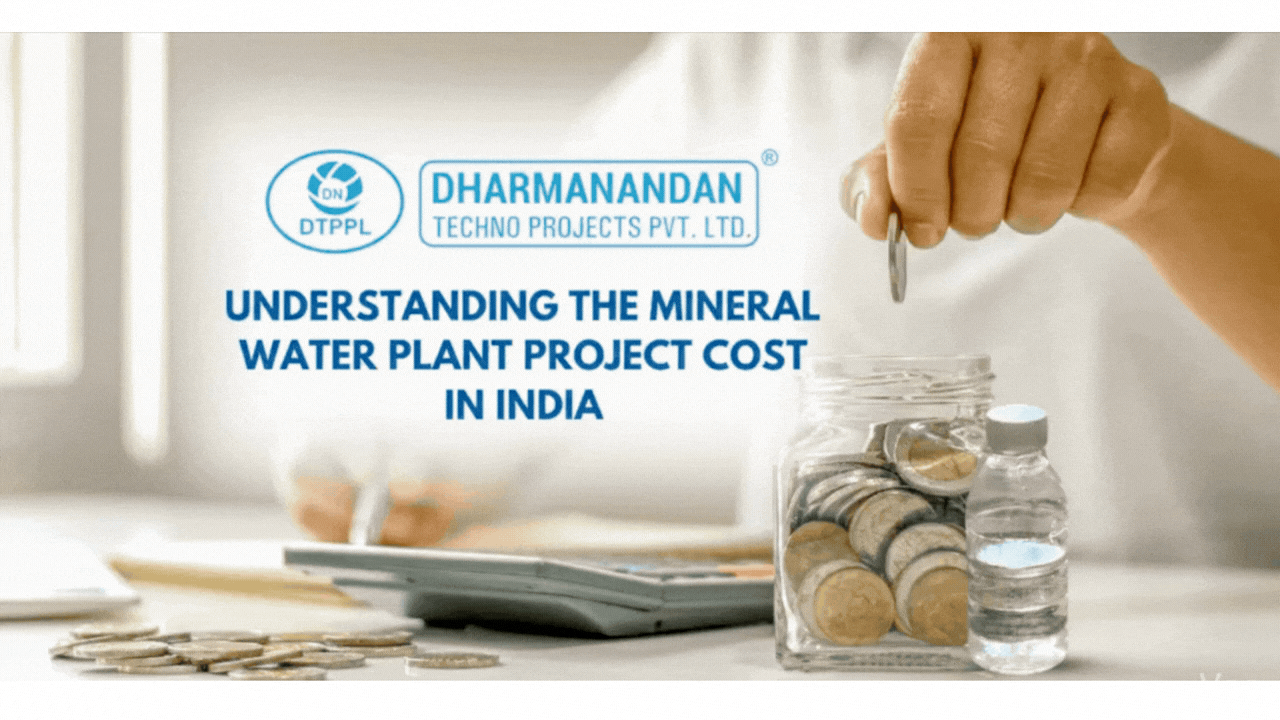
Table of Contents
Mineral Water Plant Project Cost in India 2026 – An Overview
February 5, 2026
Small, Medium and Large Mineral Water Plant Setup Price in India:
This water business article by Dharmanandan Techno Projects Pvt. Ltd. explains the cost of setting up a mineral water plant in India, covering small, medium, and large-scale bottling plant investments ranging from ₹10 lakhs to ₹1 crore. It highlights requirements like land (1,000–20,000 sq. ft.), water plantmachinery (₹10 lakhs to ₹1 crore+), and working capital (₹5–10 lakhs). A sample price list to start drinking water plants with 1,000 to 20,000 LPH capacity is also given. Overall, it emphasizes that with rising demand for safe drinking water, this business offers strong growth potential across India.
Launching a mineral water plant is more than just an investment—it’s a journey filled with ambition, challenges, and the thrill of creating something impactful. The path to seeing your brand of pure bottled water on shelves is exhilarating yet daunting, filled with questions like, “Can I manage the costs?” and “What if something goes wrong?”
This guide delves into both the emotional and technical aspects of setting up a mineral water plant in India. By real-life challenges entrepreneurs face, we’ll ensure you’re fully prepared to start your journey.
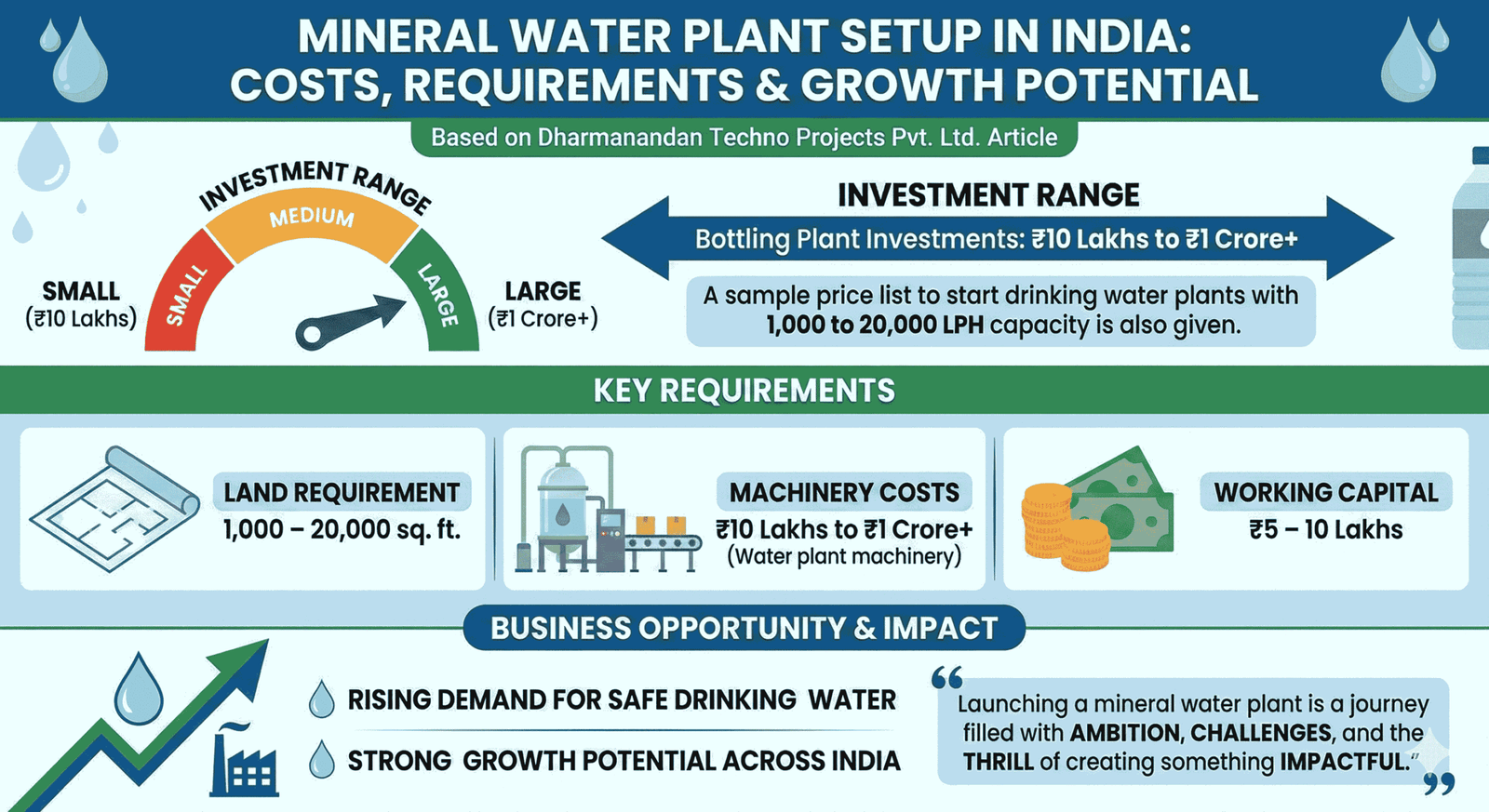
The Dream: From Vision to Action
For most entrepreneurs, the idea of starting a mineral water business comes from observing the growing need for clean drinking water. However, as the dream takes shape, doubts often emerge:
- How much will the Mineral water plant project cost?
- Can I handle the regulatory and operational complexities?
- What if I fail to meet the mineral water market’s expectations?
These fears are valid but should never deter you. The key to overcoming them is knowledge and preparation, starting with a clear understanding of the cost of a mineral water plant project.
Infrastructure & Investment Cost for Bottling Plant and Acquiring Machinery
Establishing a mineral water plant involves careful planning of infrastructure and investment in high-quality machinery to ensure efficient and hygienic operations. Begin by designing a layout that accommodates water treatment systems, bottling lines, storage areas, and quality control labs. Acquiring the right equipment-such as water purification units (RO, UV, ozone systems), filling machines, capping machines, labeling machines, and packaging systems-is crucial for smooth production. Ensure that all machinery complies with industry standards and is sourced from reliable manufacturers offering installation, training, and after-sales support. Proper setup of the plant not only enhances productivity but also ensures consistent product quality, which is vital for building consumer trust and complying with regulatory norms.
Mineral Water Plant Machinery: The Backbone
The machinery you choose determines the efficiency and success of your mineral water plant. Whether opting for a fully automatic or semi-automatic setup, it’s important to select equipment that meets your production goals and quality standards.
Fully Automatic Mineral Water Plants
Fully automatic mineral water plants are ideal for high-scale operations and provide precision, speed, and minimal manual intervention.
Core Components of Mineral Water Plant Include:
- RO Plant: For thorough water purification.
- Bottle Rinsing, Filling, and Capping Machine: Handles multiple processes seamlessly.
- Fully Auto Blow Moulding Machine: Produces bottles on-site, ensuring operational efficiency.
- Compressors, Dryers, and Chillers: Enhance the performance and durability of blow molding machines.
- Batch Coding Machine: Essential for product tracking and compliance.
- BOPP Labeling Machine & Auto Shrink Wrapping Machine: Add the final professional touch to bottles.
- Molds for Blow Molding Machines: Customizable to create bottles of different shapes and sizes.
Semi-Automatic Mineral Water Plants
For smaller production needs or budget-conscious entrepreneurs, semi-automatic mineral water plants offer a cost-effective alternative.
Key Equipment Includes:
- Semi-automatic versions of the bottle rinsing and capping machine.
- Semi-auto blow molding machine paired with compressors and chillers.
- Inkjet batch coding machine for labeling.
Customizable Solutions
Each plant can be tailored to meet specific production requirements, ensuring flexibility for businesses of varying scales.
Value-Added Technologies
Certain manufacturers offer proprietary technologies designed to enhance the taste and quality of water, giving your product a competitive edge.
Technology Integration and Automation
Q: How does technology integration and automation benefit a mineral water plant?
A: Modern technology and automation streamline processes, reduce errors, and enhance profitability. Key benefits include:
- IoT-enabled Monitoring: Real-time monitoring and analysis of water quality, machinery performance, and preventive maintenance alerts.
- Reduced Human Error: Minimizing manual interventions enhances accuracy and consistency.
- Cost Efficiency: Lowering labor costs, reducing downtime, and optimizing resource use.
Investing in automation significantly boosts your competitiveness, enhances product quality, and reduces operational expenses in the long run.
Water Business Construction and Interior Costs: Laying a Strong Foundation
Water Plant Construction Overview
The investment required for constructing a mineral water plant varies based on capacity and space requirements. Larger plants demand more extensive shade areas, while smaller setups can operate with a compact footprint. For those looking to optimize costs, renting an existing space could be a strategic alternative.
Water Plant Interior Setup
A well-designed interior is crucial for maintaining hygiene and efficiency in a mineral water plant. Flooring, layout, and finishing materials play a key role in ensuring compliance with industry standards and smooth daily operations.
Want to explore the detailed breakdown of costs? Watch the video in the blog post to get a clearer picture!
Human Resource Management and Training Costs in Mineral Water Plant
Q: Why is skilled labor crucial, and what are the related costs for a mineral water plant?
A: Skilled and trained personnel are crucial in ensuring the consistent quality, hygiene, and operational efficiency of your mineral water plant. Related HR expenses include:
- Types of Employees Required:
- Technicians
- Quality Analysts
- Machine Operators
- Maintenance staff
- Estimated Salary Range:
- Mineral Water Plant Technicians and Operators: INR 15,000 – INR 25,000 per month
- Mineral Water Plant Supervisors and Quality Analysts: INR 25,000 – INR 40,000 per month
- Training Programs:
- Regular training sessions to update employees on new technologies and quality standards
Investing in skilled labor directly correlates with improved productivity and long-term savings.
How to Secure a Reliable Water Source and Choose an Ideal Location for Mineral Water Plant?
Securing a reliable water source and selecting an ideal location are foundational to the success of a mineral water plant. The water source—such as borewell, natural spring, or municipal supply—must offer consistent availability and meet stringent quality standards required by BIS and FSSAI. A thorough hydrogeological survey and water testing are essential before proceeding. Simultaneously, choosing a strategic location with easy access to transportation, low pollution levels, stable electricity, and proximity to target markets can significantly reduce logistical costs and enhance distribution efficiency. The site should also have enough space to accommodate machinery, storage, and future expansion. Together, a dependable water source and a well-chosen location ensure sustainable production, regulatory compliance, and long-term operational success.
Water Supply: The Heart of Your Plant
Borewell Setup
Access to a reliable water source is non-negotiable for consistent production.
Raw Water Storage
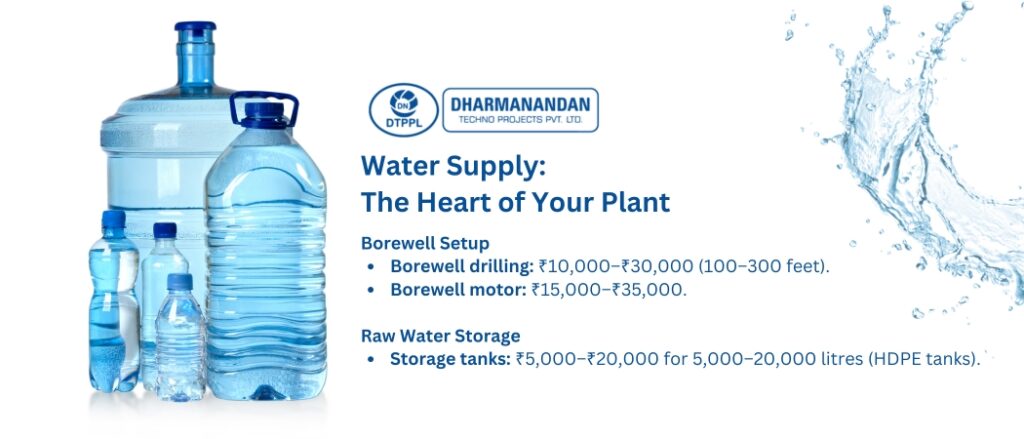
Sustainability and Environmental Responsibility
Q: Why is sustainability crucial in running a mineral water plant, and how can we achieve it?
A: Sustainability improves brand reputation, ensures compliance with environmental regulations, and attracts environmentally-conscious consumers. Ways to achieve sustainability include:
- Water Conservation: Recycling water during the filtration and purification process to reduce wastage.
- Energy Efficiency: Installing energy-efficient pumps, machinery, and lighting systems.
- Eco-Friendly Packaging: Using biodegradable or recyclable materials for packaging.
Demonstrating commitment to sustainability can significantly differentiate your brand in a competitive market.
Laboratory Setup: Quality Assurance at Every Step
To meet BIS standards (IS 14543), a well-equipped laboratory is crucial.
This ensures that every batch of water meets safety and quality regulations, building consumer trust and market credibility.
Mineral Water Plant Licensing and Regulatory Approvals: Your Gateway to Success
To legally operate a mineral water plant, securing the necessary licenses is essential. These approvals not only establish your credibility but also ensure compliance with regulatory standards:
- BIS Certification: Mandatory for meeting IS 14543 standards for packaged drinking water.
- NABL Calibration: Ensures that all testing equipment used in the laboratory is accurate and reliable.
- Application and Documentation Fees: Covers consent letters, raw water testing, and file preparation.
- Final Water Testing Charges: Includes tests for quality parameters, such as radioactive residue, to ensure consumer safety.
- Caps and Bottle Testing: Verifies the quality of packaging materials.
Want to Get BIS / FSSAI License for Packaged Drinking Water Plant? Click Here to Learn How
Curious about the costing of mineral water plant setup? Click on this video link to get more insights!
Read Our Article: How to Get ISI (BIS) and FSSAI License for a Mineral Water Plant?
Mineral Water Plant Insurance and Risk Mitigation
Q: What insurance coverage is necessary for mineral water plants, and why?
A: Insurance protects your investment against unforeseen risks and provides financial security. Essential coverage includes:
- Machinery Breakdown Insurance: Covers costs of repair/replacement of critical equipment.
- Fire and Safety Insurance: Protects your facility from fire-related damages.
- Public Liability Insurance: Covers legal claims from third parties due to accidents or contamination issues.
The estimated annual premium generally ranges between 1% to 3% of your plant’s total project cost. Insurance coverage is vital to protect your assets, mitigate risks, and ensure seamless business continuity.
Raw Materials and Working Capital for Mineral Water Business
Raw Material Costs
For smooth production, maintaining a stock of raw materials is essential.
Materials include preforms, caps, labels, and shrink rolls.
Working Capital
Monthly expenses for salaries, utilities, and equipment maintenance should be efficiently allocated to prevent financial strain.
Mineral Water Plant Maintenance and Operational Costs
Q: What are the key operational and maintenance costs for a mineral water plant in India?
A: Operational and maintenance expenses are critical to maintaining efficient operations and consistent product quality. The main costs include:
- Regular Equipment Servicing: Scheduled inspections, maintenance activities, and servicing costs.
- Replacement Parts: Expenses for filters, RO membranes, valves, pumps, and other essential spare parts.
- Energy Consumption: Regular electricity expenses associated with running machinery and lighting.
- Downtime Costs: Production loss or expenses incurred due to unplanned downtime or breakdowns.
Regular and planned maintenance ensures the plant runs smoothly, extends equipment lifespan, and minimizes sudden repair expenses.
Mineral Water Plant Cost Projection in India : A Quick Overview
Here’s a consolidated view of the mineral water plant key investment heads:
Mineral Water Plant Setup Components | Estimated Cost (INR) |
Land (Purchase/Rent) | ₹3 lakh – ₹10 lakh |
Construction & Interiors | ₹5 lakh – ₹12 lakh |
Machinery & Equipment | ₹18 lakh – ₹45 lakh |
Borewell & Water Source | ₹1 lakh – ₹3 lakh |
Raw Water Storage | ₹75,000 – ₹2 lakh |
Laboratory Setup | ₹2 lakh – ₹4 lakh |
Licensing & Documentation | ₹2 lakh – ₹4 lakh |
Office Setup & Furniture | ₹50,000 – ₹1.5 lakh |
Initial Raw Material Stock | ₹2.5 lakh – ₹5 lakh |
Working Capital (3–6 months) | ₹5 lakh – ₹10 lakh |
Branding & Marketing | ₹1 lakh – ₹3 lakh |
Total Investment Range | ₹41 lakh – ₹1 Cr.* |
*The price can vary based on type of mineral water plant configure you purchase and infrastructure you develop.
Mineral Water Plant Finance and Loan Options
Starting a mineral water plant may require an investment ranging from ₹10 lakhs to ₹1 crore depending on scale. Financing options include business loans, Mudra loans, or MSME funding schemes. For updated financing plans and assistance, you may contact Dharmanandan Techno Project Pvt. Ltd.
Mineral Water Plant Break-Even Analysis and ROI
Q: How to calculate the break-even point and ROI for a mineral water plant?
A: Understanding your break-even point and ROI helps in informed decision-making. Key calculations include:
- Break-Even Analysis: Identify fixed and variable costs and calculate the minimum sales volume required to cover expenses.
- Return on Investment (ROI): Determine profitability timeline by comparing net profit with total investment.
Typically, a mineral water plant achieves break-even within 2-3 years, depending on market conditions and operational efficiency.
Read Our Article : ROI Water’s Mineral Water Plant - Tapped from Slovenias Depths
Additional Considerations for Mineral Water Plant Project Cost
When estimating the Mineral Water Plant Project Cost, it is crucial to account for operational expenses that extend beyond initial setup. These include electricity consumption, raw material procurement, labor wages, and periodic machine maintenance. Since mineral water production involves multiple processes like purification, bottling, and packaging, energy-efficient equipment can significantly reduce long-term costs. Additionally, investing in automation can optimize efficiency, helping businesses scale while maintaining consistent quality.
Contingency Planning and Emergency Funds for Mineral Water Plant
Q: Why is contingency planning essential, and how much emergency fund should a mineral water plant maintain?
A: Contingency planning prepares your business to respond effectively to unexpected disruptions. Recommendations include:
- Emergency Scenarios: Equipment failure, natural disasters, supply chain disruptions, or sudden financial losses.
- Recommended Fund: Maintain an emergency fund equivalent to 10% – 15% of your total investment cost.
- Benefits: Ensures business continuity, maintains operations without financial stress, and allows quicker recovery from unexpected setbacks.
Proactive contingency planning ensures resilience and long-term sustainability of your mineral water plant.
The Risks of Low-Quality Equipment
Choosing between high-quality and low-cost machinery can be a dilemma. While cheap machines might save money initially, they often come with significant risks:
- Frequent breakdowns that disrupt production.
- Difficulty sourcing spare parts.
- Limited after-sales support, leading to extended downtime.
Investing in branded, high-quality machines ensures long-term reliability and profitability.
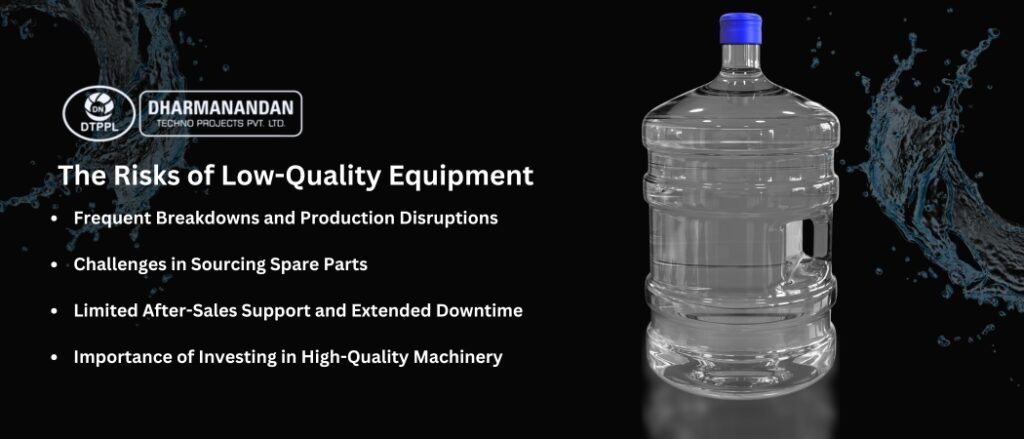
Market Positioning and Competitive Pricing
Understanding the Mineral Water Plant Project Cost also involves analyzing market trends and pricing strategies. Competitive pricing is key to gaining a strong foothold in the industry, especially when competing with established brands. Entrepreneurs should factor in branding, marketing, and distribution expenses to ensure their product reaches the right consumer base. Partnering with reliable suppliers for packaging materials and transportation can further optimize costs, allowing businesses to maintain profitability while delivering high-quality bottled water.
The First Bottle: Triumph Over Challenges
The moment your first batch of bottled water rolls off the line is unforgettable. It represents not just the culmination of technical efforts but the triumph over self-doubt and fear. It’s proof that the risks you took were worth it and marks the beginning of a new chapter in your journey.
Start Your Journey with Confidence
Setting up a mineral water plant in India is both a technical and emotional journey. By understanding the costs, choosing high-quality equipment, and preparing for regulatory challenges, you can turn your vision into a successful venture.
Want to understand the investment better? Watch the video in this blog post for an in-depth breakdown!
Take the first step today—partner with DTPPL, a trusted leading mineral water plant manufacturer, for cutting-edge machinery, expert guidance, and tailored solutions. Together, we’ll help you create a thriving business that makes a lasting impact.
Scalability of Mineral Water Business in India
India’s rising demand for packaged drinking water makes this business highly scalable. With modular setups, plant capacity can be easily increased from 1000 LPH to 10,000+ LPH. DTPPL offers complete support for scaling infrastructure as business demand grows.
Future Trends in Mineral Water Industry
Eco-friendly packaging, IoT-enabled water quality monitoring, and energy-efficient filtration systems are shaping the future. DTPPL integrates smart and sustainable technologies in its turnkey mineral water projects to keep you ahead of regulatory and market trends.
Conclusion
Launching a mineral water plant in India can be a smart business move-if planned right. From setup costs to licensing, every step matters. With expert support from companies like DTPPL, you can streamline the process and build a scalable, compliant, and profitable venture. As demand for safe drinking water rises, now is a great time to get started.
Frequently Asked Questions About Mineral Water Plant
Q: Can I start a mineral water plant with just ₹10 lakhs?
Yes, a small-scale mineral water plant with 1000 LPH capacity and manual filling can be started with ₹8–₹10 lakhs depending on location and water source. For detailed costing you may contact DTPPL.com
Q: What is the minimum space required for setup?
For a 1000 LPH plant, a space of 1000–1500 sq. ft. is sufficient, including processing, storage, and packaging zones.
Q: How long does it take to break even?
Depending on marketing, distribution, and capacity utilization, the break-even can be achieved within 12–18 months.
Read More About Mineral Water Plants
About Author
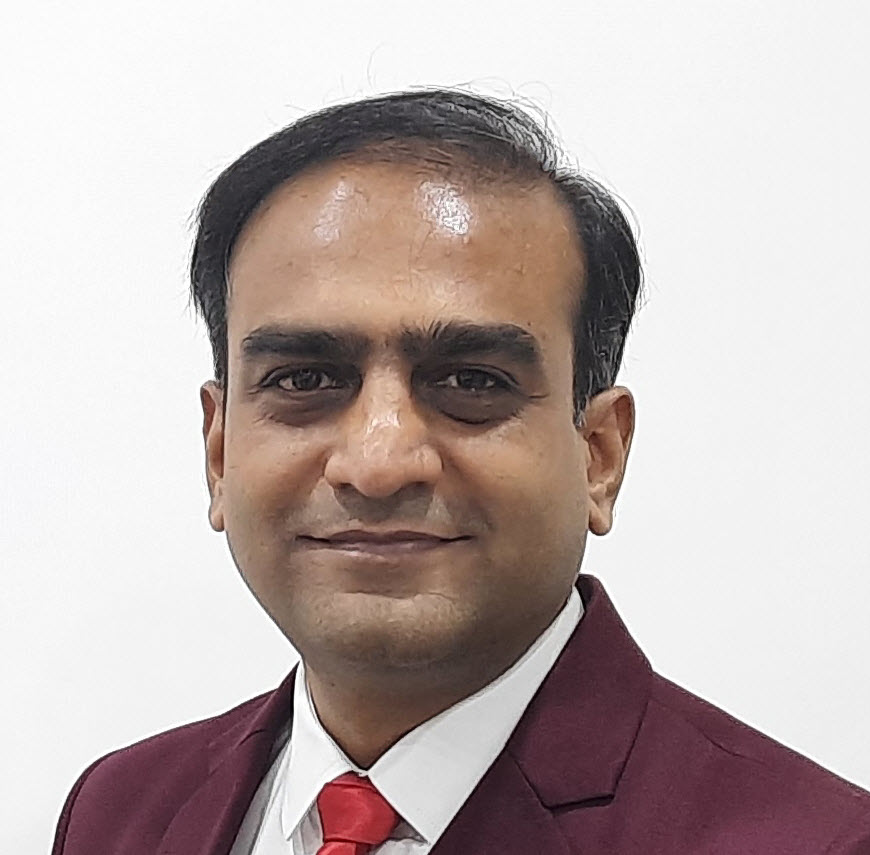
Director – Global Marketing and Sales
Mr. Bhavesh from Dharmanandan Techno Projects Pvt. Ltd. has played a pivotal role in elevating the DTPPL brand to the global stage, leveraging his exceptional expertise in marketing and communications. He is committed to helping clients achieve significant growth while strengthening their own brands. Dharmanandan Techno Projects Pvt. Ltd. is a leading manufacturer and supplier of water purification systems and turnkey solutions for mineral water plants. With years of experience in designing and delivering high-quality water treatment solutions, the company provides end-to-end services, including system design, installation, maintenance, and ongoing support. Specializing in scalable and customizable water plants, DTPPL has successfully served industries worldwide, ensuring clean and safe drinking water across diverse applications.




